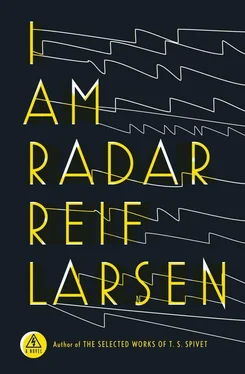“Who was it?”
“As a doctor, I’m not at liberty to give you his name, but I will say he was a Negro boy living with the Sami. I’m not sure how he got there. He spoke their language perfectly. And they had heard through the Finnmark grapevine that we were doing these kinds of experiments. And so they came and asked for this. They said it was the child’s choice.”
“How old was he?”
“Nine or ten.”
“And he wanted to change his color?”
“Apparently so. Afterwards, his appearance changed dramatically.”
She considered this. “Why did he do it?”
“I think he was confused. He was the only one who looked like he did. He wanted to be one of them.”
“But he was only a kid!” Charlene exclaimed. “How could he know what he wanted? You shouldn’t just be allowed to change him like that. What if he. . came to regret it later?”
“I didn’t give counseling in this regard. I was merely fulfilling their request.”
Kermin shifted in his chair. Radar began to sing quietly to himself, touching his fingers together: “Halfway oop or down stairs, halfway oop or down stairs. .”
Charlene looked at her son.
“Is it dangerous?” she asked.
“I don’t want to mislead you. Everything in life is dangerous. But we’re careful men here. I wouldn’t expose your child to undue harm. For this I give you my word.”
“You electrocute him?”
“It’s more like a reverse electrocution. A negative electromagnetic pulse. We call it electro-enveloping. We would uncharge his subcutaneous layer — specifically his melanosomal proteins — using very precise bilateral voltage switches. We couldn’t guarantee final coloring, but”—he leaned back, eyeing them—“we could get it close to his parents. If that’s what you want.”
Charlene held up her hands. “Well, to tell you the truth, we hadn’t even gotten that far. We haven’t even discussed it at all.”
Leif nodded. “Of course, of course. If it helps to think in these terms: we would be merely correcting a glitch in the system.”
Without warning, Kermin stood up, overturning his chair. Radar stopped and stared at his father.
“We don’t want,” he said. “Thank you, doctor, but we are saying no. To all of this. To everything: thank you, no. Come on, Charlene. We are going.”
“Kermin!” said Charlene, standing with him. “The man is just trying to—”
“This man is crazy, ” Kermin hissed. “ Jebeno lud . I work with electricity all my life and this man has no idea what he talks about. You cannot uncharge this thing. He will kill him. Do you understand? He will kill him. Dead. On je manijak. ”
Kermin picked up his son, who was looking worriedly back and forth between mother and father, sensing the bloom of anger. The knots in their voices.
“Kerm—”
“We are gone,” said Kermin, and he walked out the door with Radar in his arms. They heard Radar’s quiet cry before the door swung closed.
“I’m so sorry,” said Charlene. “We didn’t really talk this through.”
“Please, please,” Leif said, holding out his hand. “He’s mad. Okay, no problem. Maybe I came on too strong. In Norwegian we have qualifiers, and I don’t know how to translate these into English. Sometimes I get carried away. But believe me, I understand the gravity of this decision. I don’t take it lightly, at all. Just keep in mind this is a valuable offer that I’m putting on the table. Think it over. Nothing has to be decided now. You’ve come such a long way. Relax. Enjoy the famous Finnmark air. There’s no pressure to do anything right now. You are my guests. My very special guests.”
• • •
A CABIN HAD BEEN arranged for their arrival. Radar played with a miniature troll he had found on the coffee table and sang quietly to himself.
“Billy clop gruff, trip trop goat come knockin’. Knock it up my bridge.”
Charlene walked slowly around the room, running her fingertips across all the old wooden surfaces. She washed her hands and face. Kermin was busy repacking their things.
“I cannot believe it,” he was saying. “What ever happened to Europe? Drkadžije! And how do these people make a living? Where does money come from? Kakvi ludaci jebo te! ”
She came back into the room and ran her hand through her hair.
“Kermin,” she said, and she was about to ask why they had come all this way just to do nothing, but before she could even begin, Kermin looked up at her and said, without hesitation, “No,” and she knew that he was right. She put her wet hands to her face and tried again, halfheartedly, feeling the tears coming — she was not quite sure why; maybe because she knew it was already over. Her hands were cool and wet against her cheeks, and she knew it was madness. Suddenly she saw herself from a great distance, as though she were standing very still on a stage in an empty theater. How had it come to this? Why had she been so intent on coming here? What had she thought would actually happen?
“Trip trop knockin’ on my bridge, Mama!” said Radar, offering up the troll to her.
She took the troll and turned it over in her hands. “So what do we do?” she asked quietly.
“What do we do?” said Kermin. “What we’re always doing. We go home. We live our lives like people.”
“Okay,” she said. “Yes.” Breathing. “I should’ve told you. There was a telegram. .”
“Telly-gram,” Radar cried. “Machine say ‘Hello how are you?’”
“Don’t worry,” said Kermin. “We go home. We forget this.”
“Okay,” she said. “But we can’t just leave, Kerm. The plane is tomorrow. You can’t just wait by the door the whole evening with your suitcase. Be gracious. The man just wanted to help us.”
“The man does not say what he really wants.”
“Just be nice. For tonight, and then tomorrow we can leave. We don’t have to do anything. It’s a vacation, that’s all. Think of it like that. They paid for it. We’re on vacation.”
He stood still. “For you,” he said finally. “And then we go.”
“And then we go,” she agreed.
They embraced. It had been a long time since they had hugged like this. Radar came over and grabbed their legs. Charlene smelled the beginnings of her husband’s beard, the quiet and familiar symphony of waxen musk lingering in the neglected crinkles behind his ears. She had forgotten all this. Routine had a way of erasing intimacy’s quiet particulars.
The evening came, though the sun showed no intention of setting. Leif, now dressed in a crisp white button-down with yellow trousers and plush leather slippers, served them a delicious dinner of salted herring, a rutabaga-and-carrot puree called kålrabistappe, lamb sausage, and a small piece of whale meat, which Charlene tried but could not stomach.
“I’m sorry the others couldn’t join us,” said Leif. “We’re a bit swamped with all of the preparations.”
“What’re you preparing for?” Charlene asked.
“Probably a great disaster.” He laughed. “Would you like to try some aquavit? We make it here.”
Kermin refused the liquor, but Charlene warmed and opened with each glass. Radar gave a running commentary on the meal. With theatrical precision, Leif listened to the child’s words and nodded his agreement.
“Yes, yes, I’ll tell the cook,” he said. “I do apologize.”
Charlene smiled. She felt free. She wanted to tell this man everything. To kiss his bald head. They did not speak of Radar’s treatment. There was no need.
After dinner, they said goodnight to their host and walked into the strange, enduring daytime. On the path back to the cabin, they encountered an older man carrying a stack of books.
Читать дальше












